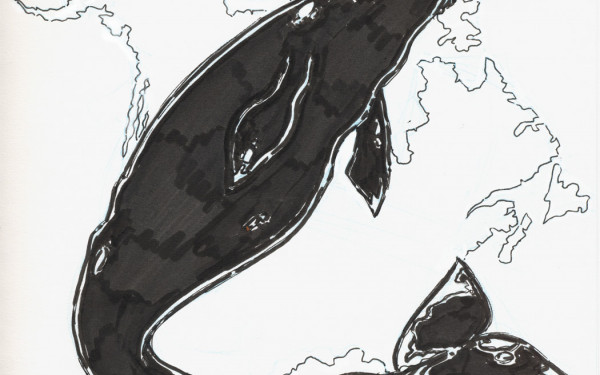Concordia Researchers Organize First-Of-Its-Kind Conference
Loyola Sustainability Research Centre links environment, public health and conflict.
According to the Centers for Disease Control and Prevention, more than 11,000 people died after contracting Ebola in 2014.
Studies have linked deforestation in Africa as one of the causes of the disease’s outbreak, but two Concordia University researchers believe that another factor may have influenced the spread of the virus: conflict.
This idea encouraged Dr. Peter Stoett, Director of the Loyola Sustainability Research Centre, and his colleague Adan Suazo to organize a conference called, “Avoiding Catastrophe: Linking Armed Conflict, Harm to Ecosystems, and Public Health” that will take place from May 4 to 6.
“What we noticed at [the research centre] was that the countries that were most affected by the Ebola outbreak were countries that had suffered [or continue to suffer] the legacy of conflict,” Suazo explained.
In fact, the three most affected countries during the Ebola outbreak––Guinea, Sierra Leone and Liberia––all had at least one civil war in the last thirty years.
It’s the first time a conference will focus on three aspects: environmental degradation, conflict, and public health, insists Edith Gaudreau-Lebel, the conference’s coordinator.
“The interconnection has never been done academically,” said Gaudreau-Lebel, who is a Concordia student.
To make that interconnection, the research centre at Loyola has invited a number of experts and scholars with various backgrounds.
Evidence of that diversity are the two keynote speakers: Dr. Keith Martin and Adan Suazo Morazán.
Martin, the Executive Director of the Consortium of Universities for Global Health, was a Canadian MP for 18 years in British Columbia. Suazo believes Martin “transcends the world of decision-making and advocacy.”
In 2007, for example, Martin “asked the [Canadian] government to expel Zimbabwe’s top diplomatic representative to Canada on the ground of Zimbabwe’s egregious human rights violations,” according to a 2010 report published for the Montreal Institute for Genocide and Human Rights Studies.
MIGS is one of the partners for the conference, and two of the authors of that 2010 report––Dr. Frank Chalk and Kyle Matthews––will be present at the conference.
The second keynote speaker, Morazán, is a minister for the Embassy of Honduras in Brazil and the Chief of Staff for the Office of the Ministry of Foreign Affairs of the Republic of Honduras.
Suazo described Morazán as a “well-known and respected diplomat from Central America,” for his work with organizations like the United Nations Development Programme and the World Bank.
“His input within the purview of the Conference will be key,” Suazo said.
Morazán’s position as a minister in Brazil is key to the conference, said Suazo, since the South American country is the “epicentre of the Zika outbreak.” The Zika outbreak and the Ebola crisis are “concrete ideas of what goes on in the world,” said Gaudreau-Lebel.
While Morazán will be able to provide expertise of the situation regarding the Zika Virus, Suazo is also pleased to have the expertise of Dr. Marieme Lo on the Ebola crisis. Lo is a Women & Gender Rights Studies and African Studies Professor at the University of Toronto.
Suazo added that the conference will also feature representatives from Amnesty International and Doctors Without Borders.
Student Participation Lags
Two Concordia students will also present their work during the conference. In February, Adan Suazo and the Loyola Sustainability Research Centre had a call for submissions from students. The centre “did not receive as much a critical response as we had expected,” Suazo admitted.
“The original plan was to have a wider student participation,” Suazo said. The conference organizers only received two student papers. Students were initially asked to submit a 50-word abstract by no later than March 4, 2016, as indicated in the document sent by email.
The document stated there would be a student workshop “allowing young scholars to showcase their work and contribute to the broader questions being asked at the conference.”
The workshop will not take place due to the lack of student input and it was removed from the conference’s extended programme. The conference organizers decided to incorporate the student papers within the overall expert workshops, according to Suazo.
The two students are Adnan Raja, a PhD candidate in political science at Concordia and Michael Twigg, a graduated student from the international development studies program at McGill University and Political Science at Concordia.
Raja and Twigg were the only students whose papers the LSRC received, and consequently the only two student papers that will be presented.
“Adnan has worked closely with [the centre] for a while now, and he was a natural choice to participate in the experts panels,” said Suazo.
As a research institute, it was important to provide a venue for student work, Suazo explained.
“Everyone, whether student or not, will be given 15 minutes to present their work, and I believe this is the reason why this conference is so cutting-edge: researchers, faculty, practitioners and students will have an equal footing, in a place where fresh ideas can be debated and analyzed.”
Avoiding Catastrophe: Linking Armed Conflict, Harm to Ecosystems, and Public Health // May 4 to 6 // Sir George Williams Campus (1400 de Maisonneuve St. W.) // Register in advance // More info here



_600_375_90_s_c1.jpg)
_600_375_90_s_c1.jpg)

_600_375_s_c1.png)